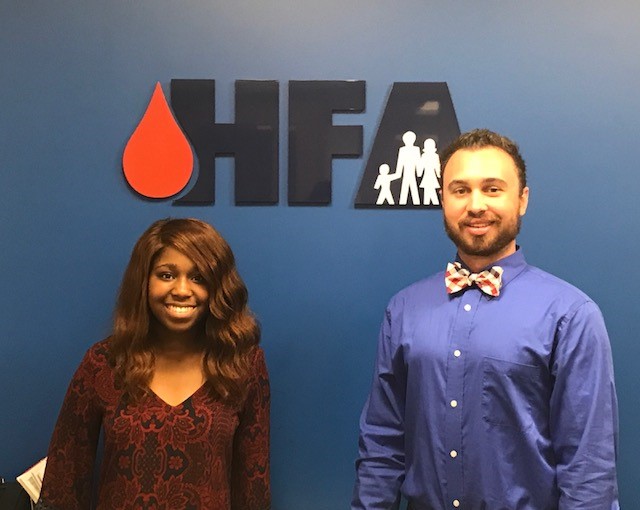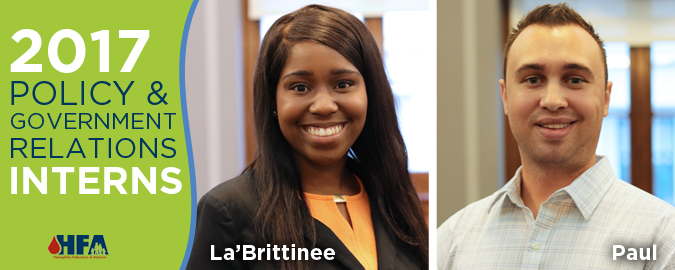The halfway point of our Policy and Government Relations Internship program is an excellent time for the interns to reflect on the first five weeks of their internship. La’Brittinee and Paul break down what an average week looks like for them as an HFA intern.
Paul:
After our first action packed week of the internship involving our day on the Hill, we became more settled down into what a normal week would look like for us. Our primary task for the internship involves a federal project. Both of us were given the ability to choose the subject for this project with the only requirement being that our paper was policy oriented. I chose to write about the American Health Care Act (AHCA), but had to change my topic mid-summer due to the Senate completing a discussion draft known as the Better Care Reconciliation Act (BCRA). In this paper, I will be contrasting how the Affordable Care Act (ACA) and BCRA are different from each other. Additionally, I will go into how the proposed legislation affects the bleeding disorder community, any negative or positive outcomes for the overall community, and potential long term impacts. Needless to say, my assignment has been an ever-evolving project just like the policies currently surrounding health care.
La’Brittinee:
As Paul stated, a great deal of our work involves working on individual state and federal projects. My federal project is a ten-page research paper covering children’s patient rights in the United States. The content of my paper includes the history of children’s patients’ rights in this country, children’s rights in emergency circumstances, medical kidnapping, and children’s patient rights in the hemophilia community. From this paper, I hope to gain better knowledge of children’s rights as patients and offer insightful advocacy for these children in the future. My state project for Tennessee includes working on an advocacy plan for our state’s member organization, the Tennessee Hemophilia & Bleeding Disorders Foundation. Through this project, I hope to take the advocacy skills I’ve gained at HFA and assist my state’s member organization in implementing a more effective and active advocacy plan.
A portion of the work in our weekly schedule involves completing other healthcare related research projects. One of the projects we were most recently assigned is revolved around the Center for Medicare & Medicaid Innovation (CMMI). During this project, we had to complete research on how CMMI started and the purpose of CMMI. Concluding the completion of this project we will each submit our research to Deema, HFA’s Policy Analyst, and receive feedback. In the upcoming weeks, we will begin working with Elaine, HFA’s Programs Manager & Senior Research Analyst, on other HFA research projects. Opportunities such as these not only provide us with research skills to implement in the future as we continue our education, but also provides firsthand experience on learning more about the bleeding disorders community.
Paul:
Throughout the week, we have a variety of tasks to complete. Every week we have at least one hearing or event of some kind to attend. All of which are in regards to health care legislation and arguments presented from a wide range of viewpoints. Frequently, I have seen many communities show up to these hearings or events and voice their fear of losing access to not just their health care, but their ability to be a productive member to society. I have a great deal of respect for those who have travelled here from all walks of life and from different parts of the country, despite the great hardships and inconveniences incurred on them throughout their journey. These people are brave and deserve to live a life of happiness that is equal to all other Americans. During each hearing, we take notes and then summarize the fundamental issues associated with each event. Ultimately, we do our best to write a summary that makes HFA’s Outreach team feel like they were there listening and attending the event themselves. I have learned so much at these events and they have proven to be a great resource of raw information, data, and emotion.
La’Brittinee:
Over the course of this internship, besides committee hearings and research, we aid in many tasks that benefit HFA and state Member Organizations. As the day on the Hill was approaching, we constructed binders for each constituent containing all information they would need along this journey. Furthermore, after the day on the Hill, Paul and I completed spreadsheets with information of all business cards received throughout that day. On other days, these tasks involve delivering items to other offices or sitting in calls addressing the latest health care news. When sitting in on calls we take notes as we listen and submit them to Deema after. This allows her and other office staff to complete their priority work while still having a listening ear to what’s happening in health care.
 Paul:
When we are not attending hearings, we spend most of the time doing research in the office. The research that we find and read is all related to health care and the policies surrounding the ever-changing atmosphere. Throughout this internship, we both have learned a great deal about the AHCA and how it can affect our community and all Americans. Not only that, but we are learning the complexities of health care. The research that can be conducted regarding health care is virtually endless. Many times, during my research the more I have read and learned, the less I feel that I know and the more questions I gain. Ultimately, I focus on issues that directly affect the bleeding disorder community and study exactly how these issues will have an impact on the community. Both of us remain hopeful that patients will continue to have a voice and receive care that is vital to maintaining a happy and healthy quality of life.




